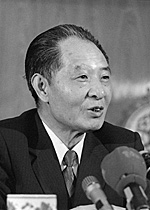




HONG KONG—Chinese public security officers dragged away two Hong Kong journalists as they tried to interview a former aide to disgraced Communist Party chief Hu Yaobang, the ex-aide has told RFA’s Mandarin service.
“The two Hong Kong reporters arrived in Xian Saturday evening,” Lin Mu told reporter Shen Hua. “They had called me from Beijing and asked to interview me about the life of Hu Yaobang.”
“They came to the front gate around 9:15 Sunday morning. They didn’t know the exact number of my building, so they called me from their mobile phone and asked for information. I said I would go meet them. One of them is surnamed Hu. He’s a reporter with Hong Kong Cable Television. There was another, a younger person,” Lin said.
Other sources said the two were well-known Hong Kong reporter Hu Lihan, accompanied by his cameraman.
“I met up with them, and we started walking back toward my residence. Security personnel stopped them and asked, ‘Are you Hong Kong reporters?’ They said, ‘Yes.’ And security personnel prevented them from proceeding any farther.”
I met up with them, and we started walking back toward my residence. Security personnel stopped them and asked, ‘Are you Hong Kong reporters?’ They said, ‘Yes’... Security personnel...dragged them into a car.
“Then the reporters suggested that we do the interview somewhere else. Security personnel said no and dragged them into a car. I don’t know their whereabouts. And they never called me again,” Lin said.
“I asked an acquaintance of theirs in Beijing but was still unable to find out where they were,” Lin said.
A source in Beijing said the two men had been deported to Hong Kong. No comment was immediately available from the Hong Kong Cable Television.
Lin, now 78 and a Shaanxi native, served as secretary to Hu until Hu was forced to step down in 1987 as General Secretary of the Chinese Communist Party of China for failing to control student protests a year earlier.
He moved to the central Chinese city of Xian—home of the renowned terracotta warrior statues—some time later.
“They made the trip to Xian especially to interview me about Hu Yaobang. The security personnel didn’t give a reason for taking them away. I am very angry about this,” Lin said.
“Through a friend, I have relayed the incident to Li Zhao, Hu Yaobang’s wife. And she said, ‘Events commemorating Hu Yaobang are taking place all over the country at the provincial and municipal levels. The central government allows and approves of them. How can something like this happen?’“
Lin also reported increased security at his own home in the runup to what would have been Hu’s 90th birthday, on Nov. 20.
“By the front entrance there is the usual reception office. But in recent days cadres have been added to guard duty. There are no public security personnel on guard duty. The extra cadres on duty are from the provincial party committee. There are several cars parked outside, two or three with public security tags. The others are unmarked. They are just waiting to take people away,” Lin said.
Last week, a former aide to Hu’s successor Zhao Ziyang, Bao Tong, called on the regime to face up to its mistakes ahead of a memorial for Hu.
“I am in favor of commemorating Hu Yaobang. But it should be done with the right intent,” Bao Tong, under virtual house arrest in Beijing since his fall from grace after the 1989 student-led protests, wrote in a commentary aired Tuesday on RFA’s Mandarin service.
“The Chinese Communist Party (CCP) should learn a painful lesson from its treatment of Hu Yaobang, and through its commemoration of him, should learn once more the art of self-criticism.”
China’s leaders are planning a memorial event in the Great Hall of the People to mark the 90th anniversary of Hu Yaobang’s birth, sources told RFA last month. But analysts warn against viewing the move as representing any discussion of the former leader’s liberal reform agenda.
Hu was sacked as general secretary of the Communist Party in 1987 for leaning towards “Western, bourgeois” principles of democracy and rule of law, amid a political campaign orchestrated by then supreme leader Deng Xiaoping.
“The only meaningful way to be worthy of Hu Yaobang, to remember Hu Yaobang, is in the spirit of Hu Yaobang,” Bao wrote, praising Hu’s overturning of large numbers of summary verdicts handed down to ordinary people during China’s disastrous Cultural Revolution (1966-76).
Popular among ordinary Chinese for rehabilitating millions purged during the 1957 Anti-Rightist Movement and for righting some of the wrongs of the Cultural Revolution, Hu was mourned by thousands on Tiananmen Square in April and May 1989.
This demonstration of public grief and outrage sparked the student-led pro-democracy movement, which ended with hundreds, perhaps thousands, of deaths in early June that year, and triggered the fall of Zhao Ziyang.
But Chinese political analysts are cautious about assuming that the memorial event for Hu constitutes a political “rehabilitation,” with possible implications for overall Party policy, which has ruled out all talk of political reform since 1989.
Original reporting in Mandarin by RFA Mandarin service broadcaster Shen Hua. Mandarin service director: Jennifer Chou. Produced in English by Sarah Jackson-Han. Edited by Luisetta Mudie.